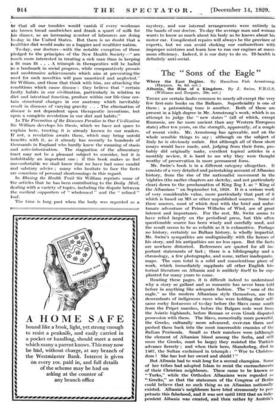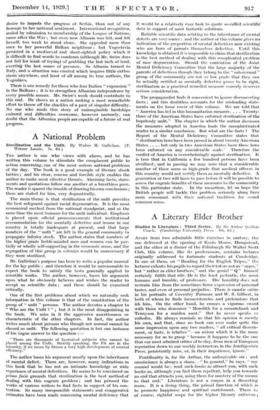The " Sons of the Eagle THERE are certain faults
common to nearly all except the very few first-rate books on the Balkans. Superficiality is one of them ; a patronizing tone is another. Both of these are present in a high degree in Mr. Armstrong's work, which is an attempt to judge the " new states " (all of which, except Rumania, are far more ancient than any Western European state) after ten years, on the strength, apparently, of a couple of recent visits. Mr. Armstrong has agreeable, and on the whole sensible things to say ; although on the subject of Italy he is obviously unfair. But although all of these short essays would have made, and, judging from their form, pro- bably did originally make, excellent topical articles in a monthly review, it is hard to see why they were thought worthy of preservation in more permanent form.
Mr. Swire's book is in a different category altogether. It consists of a very detailed and painstaking account of Albanian history, from the -rise of the nationalist movement in the 'eighties (the earlier chapters are sketchy, and not particularly clear) down to the proclamation of King Zog I. as " King of the Albanians " on September 1st, 1928. It is a serious work of very considerable value, more particularly that part of it which is based on MS or other unpublished sources. Some of these sources, most of which deal with the brief and unfor- tunate adventure of Prince Wilhelm of Wied, are of great interest and importance. For the rest, Mr. Swire seems to have relied largely on the periodical press, but this often questionable source has been wisely and carefully used, and the result seems to be as reliable as it is exhaustive. Perhaps no history, certainly no Balkan history, is wholly impartial. Mr. Swire's sympathies are undisguisedly with the heroes of his story, and his antipathies are no less open. But the- facts are nowhere distorted. References are quoted for all im- portant statements of fact ; there is a bibliography and a chronology, a few photographs, and some, rather inadequate, maps. The sum total is a solid and conscientious piece of work, which immediately supplants all other English his- torical literature on Albania and is unlikely itself to be sup- planted for many years to come.
Reading these pages, it is difficult indeed to understand why a story so gallant and so romantic has never been told before in anything like adequate fashion. The " sons of the eagle," as the modern Albanians style themselves, are the descendants of indigenous races who were holding their self- same rocky fastnesses of to-day before the Slays came south from the Pripet marshes, before the Bulgars rode west from the Asiatic highlands, before Roman or even Greek disputed possession with them. The Slays, numerically more powerful, the Greeks, culturally more advanced, over-ran them- and pushed them back into the most inaccessible crannies of the Balkan Peninsula. Small as their numbers were (although the element of Albanian blood among the Serbs, and still more the Greeks, must be large) they resisted the Turkish advance fiercely ; and when their hero, Skanderbeg, died in 1467, the Sultan exclaimed in triumph : " Woe to Christen- dom ! She has lost her sword and shield ! "
But Albania had to wait long for a second champion. Some of her tribes had adopted Islam to resist the encroachments of their Christian neighbours. These came to be known as " Turks," while the Orthodox Albanians were regarded as "_ Greeks," so that the statesmen of the Congress of Berlin could believe that no such thing as an Albanian nationally existed. Albania's neighbours have tried strenuously to per- petuate this falsehood, and it was not until 1918 that an inde- pendent Albania was created, and then rather by Austria's
desire to impede the progress of Serbia, than out of any homage to her national sentiment. International recognition, sealed by admission to membership of the League of Nations, came after the War ; but even now Albania was felt, and felt herself, too weak to stand alone. She appealed more than once to her powerful Balkan neighbour ; but Yugoslavia persisted in a mediaeval and short-sighted policy which it is difficult to find words to condemn- (although Mr. Swire does not;fail for -Want of trying-) of grabbing the last inch of land, exerting the last ounce of pressure. So Albania turned to Italy; and a situation was created which inspires little enthu- siasm anywhere, and least of all among its true authors, the Yugoslays.
There is one remedy for those who fear Italian " expansion " in the Balkans ; it is to strengthen Albanian independence by every possible .means. Mr. Swire's work should contribute to this end. He shows us a nation making a most remarkable effort to throw off the shackles of a past of singular difficulty. No one who reads this story of unimaginable hardships endured and difficultieg overcome, however narrowly, can doubt that the Albanian people are capable of a future of real progress.













































 Previous page
Previous page